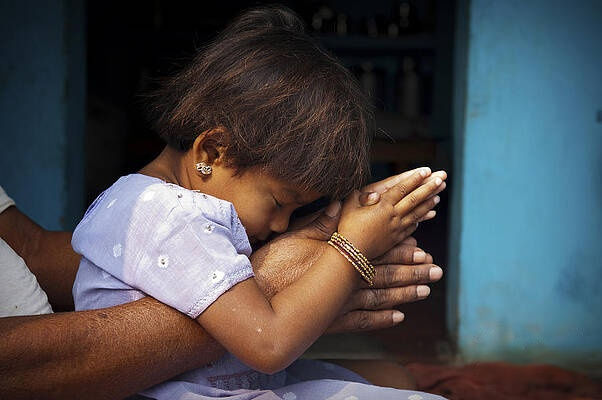How to pray?
- Charles
- 26 juil. 2025
- 4 min de lecture
Reflections on the Seventeenth Sunday in Ordinary Time: Genesis 18:20-32, Colossians 2:12-14, Luke 11:1-13

When Jesus finished praying, a disciple asked, “Lord, teach us to pray”. Inspired by Jesus in prayer, they sought to learn. This disciple’s request is unambiguous: “Teach us to pray”, not “teach us a prayer”. In his response, he does not teach them a formula to repeat, but a method that teaches us how to pray as he did. So, how to pray?
1. To Pray, Relate:
Jesus begins with an intimate address: “Father” (Luke) or “Our Father in heaven” (Matthew). This invocation reveals a life immersed in the Father. For Jesus, prayer is less about technique than relationship. His prayer was a levitation/ movement towards our “Abba/Appa.” The first word of the Lord’s Prayer marks Christianity’s radical newness: the right to call God Father, an offer of love surpassing imagination. God is not a tyrant to fear but a Father to love. As Teresa of Lisieux said, prayer is “a surge of the heart; it is a simple look turned toward heaven, it is a cry of recognition and of love, embracing both trial and joy”. Prayer is above everything, a way of relating to the Father.
2. To Pray, Prioritise:
This intimate relation with the Father becomes the basis of the second part of the Lord’s prayer: prioritising God. After the invocation of God as Father, we express our two desires: “Hallowed be your name, your kingdom come”. (Matthew adds a third: may your will be done on earth as it is in heaven). The Lord’s Prayer prioritises God’s name, kingdom, and will above our needs and wants. Prayer isn’t a wish list; it begins not with our desires but with our consistent choice for God’s glory. Why? Starting with God's priorities reshapes our own desires. By focusing first on His name, kingdom, and will, we are gradually conformed to His priorities, making our subsequent requests more aligned with His heart. As theologian N.T. Wright observes: “This prayer isn’t a spiritual technique, but a declaration of allegiance. We ask for bread, forgiveness, and deliverance because we belong to God’s kingdom and these are the marks of kingdom life”.
3. To Pray, Depend Persistently:
This God-centered posture frees us to ask for essentials: daily bread, forgiveness, and resisting temptation. There is a profound threefold structure in these petitions that reveals Jesus’ comprehensive vision for human dependence on God.
1. “Give us today our daily bread” (material dependence). “daily bread” (Greek: epiousios artos), which implies immediate, essential provision, not stockpiling resources. Our prayer confesses that even daily bread is grace, not entitlement. The food that strengthens us (daily bread and Eucharist) is a gift of God, our Creator and Provider. We approach our Father God with the dependence and trust of a child to ask for our daily sustenance. Jesus cites the example of a man who persistently knocks on his friend’s door at night for merely three loaves of bread. He knows the door is locked, the family is asleep, and he persists. Why? Because he is completely dependent on his friend. He has a guest who needs to be fed, but he has nothing. In his desperate need, he turns to his only support. Our prayer is an expression of our complete dependence on God for our daily material existence.
2. “Forgive us our debts/sins, as we forgive our debtors” (relational dependence). This links divine forgiveness (vertical unity) with human forgiveness (horizontal unity). Receiving God’s mercy compels us to extend it. While sin creates relational rupture (with God and others), forgiveness restores it. Abraham’s intercession for Sodom and Gomorrah (first reading) embodies this relational dimension of prayer. He intercedes for Sodom despite its wickedness (v. 20) and personal opposition to him (Lot’s mistreatment in Genesis 19:9). His audacious haggling (50 to 10 righteous) reflects his relationship with God as a covenant partner (vertical dimension). His intercessory prayer demonstrates that prayer bridges broken relationships and extends to standing in the gap for a broken world, pleading for mercy, trusting God’s character, and seeking restoration even when others oppose God.
3. “Lead us not into temptation, but deliver us from evil” (spiritual dependence): This petition is a profound acknowledgement of human frailty in the face of "temptation". In Greek, the word peirasmos encompasses more than mere enticement to sin; it signifies a trial or testing, whether originating from our own internal desires that pull us away from God or from external pressures and spiritual forces designed to challenge our faith. We are reminded that, by ourselves, we are ill-equipped to triumph over evil in its myriad forms, both subtle and overt. Therefore, we earnestly seek God’s divine intervention and strength in what is, indeed, a cosmic battle (Ephesians 6:12:). The interconnectedness echoes in the second reading, where Paul affirms that our faith in the omnipotent power of God’s help is the very mechanism by which we are not only shielded from temptation but also delivered from our spiritual "bonds" (debts: Greek: opheilēmata) and, ultimately, from the dominion of death. These opheilēmata are not solely financial debts but represent our spiritual shortcomings, our failures to live up to God's perfect standard, and the burdens of sin that weigh us down. Through Christ’s redemptive work and our reliance on God’s delivering power, we are freed from these spiritual obligations and the ultimate consequence of sin, which is death.
Thus, the Lord’s prayer covers physical (bread), community (forgiveness), and spiritual (warfare) dimensions, leaving nothing outside God’s care. Christian prayer rejects self-sufficiency; it is lived as a dependent child: receiving, restoring, and resisting in a world anchored in God’s Fatherhood. How to pray? Live in a radical relationship, God-centered priority, and holistic dependence.




Commentaires